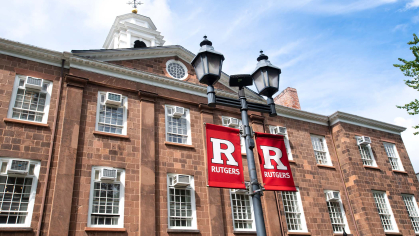Rutgers Board of Governors Approves $5.9 Billion Budget, Prioritizes Support for Students in Greatest Need
Budget reflects ongoing commitment to student aid amid federal uncertainty and rising costs
The Rutgers Board of Governors today approved a $5.9 billion university operating budget, supported in part by a 5% tuition increase for in-state students and a 6% increase for out-of-state students for the 2025-2026 academic year.
As federal funding disruptions impact universities, Rutgers remains focused on improving student access and affordability. Through income gap-bridging programs, including the Scarlet Guarantee in New Brunswick, RU-N to the TOP in Newark and Bridging the Gap in Camden, students with family adjusted gross income (AGI) up to $65,000 pay zero for tuition and mandatory fees.
For new students with higher family AGI, Rutgers will cover tuition gaps that are no longer covered through the state Garden State Guarantee (GSG) program. With Rutgers’ contributions, new students with family AGI of $65,001-$80,000 will pay no more than $3,000 in annual tuition and fees, and for AGI of $80,001-$100,000, students will pay no more than $5,000 in tuition and fees in the 2025-2026 academic year. GSG will cover continuing students in their third and fourth years, with additional support from the university.
Through these and other programs, about 75% of Rutgers undergraduates received some form of student financial aid in the 2024-2025 academic year.
Tuition for a typical full-time arts and sciences undergraduate who is a New Jersey resident will increase on average $711 for the academic year from $14,222 to $14,933. Fees vary by program, but average mandatory fees are estimated to increase by about $185 annually for in-state and out-of-state students. Tuition for out-of-state students will rise from $33,734 to $35,758.
“The Board of Governors remains deeply committed to ensuring that Rutgers delivers a world-class education that is both accessible and affordable for our students. At the same time, we must address the significant fiscal challenges facing higher education nationally and take responsible steps to safeguard the university’s long-term financial health. This budget reflects a difficult but necessary balance between those goals,” said Rutgers Board of Governors Chair Amy L. Towers. “The Board looks forward to working in close partnership with President Tate and the university community to strengthen Rutgers’ financial foundation and ensure its continued excellence for generations to come.”
The budget for the fiscal year that began July 1, 2025, reflects uncertainty around federal funding, a rise in operating costs associated with increases in negotiated salaries and fringe benefit expenses, inflationary increases across all non-personnel costs – including technology, supplies, services, and capital construction – and need-based student financial aid. The budget also reflects significant expense reduction efforts by the university, including a 4% cut to central office budgets for the upcoming year.
The majority of the budget funds:
- the university’s core mission of student instruction, support, scholarships, and financial aid; public service and patient care; sponsored research and related programs – 76%
- administration, operations and maintenance – 16%
- services including housing, dining and parking operations – 5%
- Division I athletics – 3%
"My colleagues developed a budget that sustains Rutgers’ momentum as an engine of social mobility by prioritizing resource development to deliver student financial aid at scale. This budget achieves this goal despite uncertainty and intense cost-increase pressures,” Rutgers President William F. Tate IV said. “We must continue making difficult decisions to ensure the long-term sustainability of this capacity to support our students."
Revenues to fund the university’s budget come largely through tuition and fees (27.7%); the State of New Jersey (18%); patient care services (20.4%); sponsored research (14.1%); and miscellaneous sources, including housing, dining, parking services, student aid, athletics, gifts and donations, and endowment and investment income (19.8%).
While state support of Rutgers remains strong – the final New Jersey state budget restored nearly all of $65 million in proposed cuts to the university – the state’s share of overall budget revenues has declined to 18% for FY 2026, down from about 20% in each of the past three years.
“As higher education faces challenges due to government funding uncertainty, rising costs, demographic shifts and other headwinds, this balanced budget reflects fiscal discipline and our efforts to continue to strengthen the university’s long-term financial sustainability,” said J. Michael Gower, Rutgers’ executive vice president, chief financial officer and treasurer.


